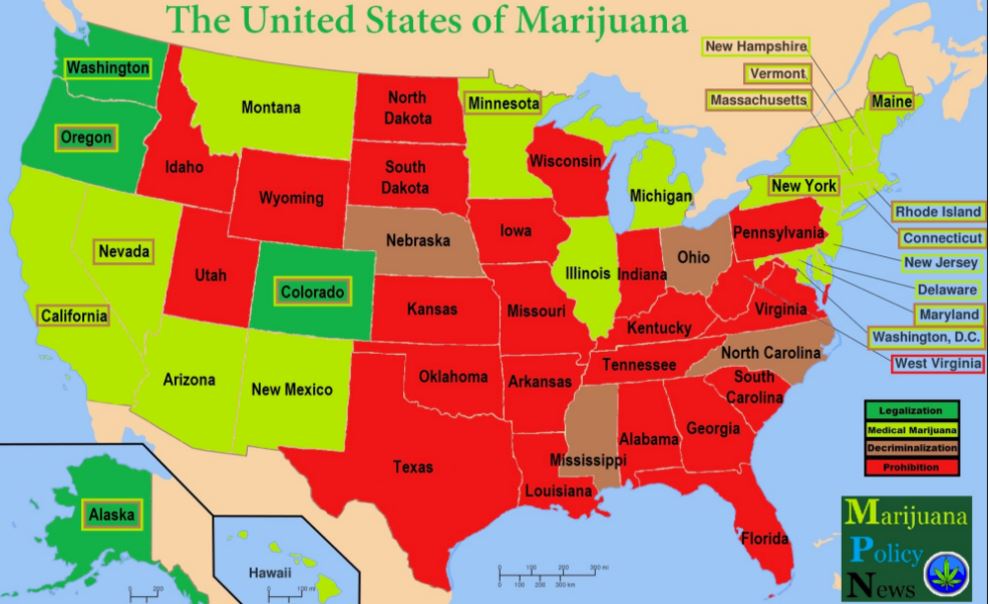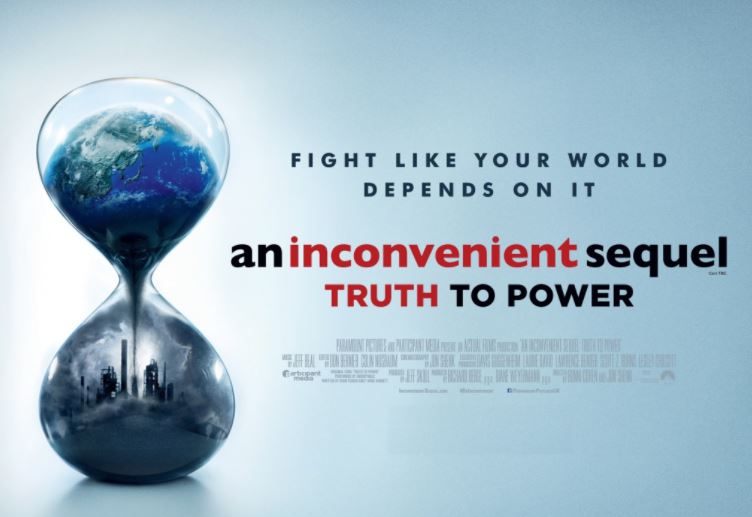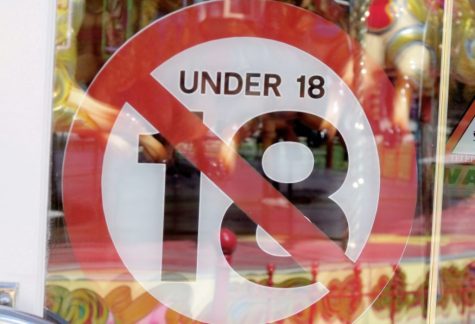Marijuana Legalization
June 2, 2017
You may know it as pot, grass, Mary Jane, or a more modern term, weed. Depending on what time period you grew up in, one of these may sound more familiar than the other, but they are all names for marijuana. This little plant has caused much controversy in today’s world. There is a large group of people who believe that marijuana should be legalized in all states, but there are still some who disagree. With the overwhelming amount of benefits it brings, why be against it?
Marijuana has been proven to have many benefits, health included. According to Business Insider, medical marijuana can aid in treating glaucoma, an illness that causes an increase in pressure on your eyeball, damaging optic nerves and eventually leading to blindness. The effects of the drug may slow the progression of the disease, which could prevent the users from becoming blind (Welsh, Loria).
Another medical benefit marijuana has is it can be used to treat epileptic seizures. DeLorenzo, from Commonwealth University in Virginia, did a test on epileptic rats. His data showed that the seizures were prevented for up to ten hours. “Cannabinoids, like tetrahydrocannabinol (THC), bind to the brain cells responsible for controlling excitability and help to regulate relaxation,” causing a delay in seizures (DeLorenzo).
One very controversial yet groundbreaking argument is the medical benefits cannabis has for cancer. Researchers at California Pacific Medical Center found that cannabidiol can “turn off” a gene called Id-1. This specific gene makes copies of cancer cells. Cancer cells make more copies of that gene, then spread throughout the body. Researchers studied breast cancer cells, then treated them with cannabidiol. They found that the cells decreased in size and were less aggressive (Welsh, Loria). This could lead to a cure for cancer.
As many people know, marijuana has been said to help people with anxiety. Some users claim it helps to relieve pain and suppress nausea. Researchers at Harvard Medical School found that the benefits could improve the smoker’s mood and can act as a sedative in low doses (keeping in mind, larger doses could cause paranoia, therefore increasing anxiety) (Welsh, Loria).
According to Business Insider, THC has been said to “slow the formation of amyloid plaques by blocking an enzyme in the brain that makes them” (Welsh, Loria). These plaques seem to be what kills brain cells. When a synthetic mixture of CBD and THC was used on mice with a model of Alzheimer’s, it seemed to preserve their memory (Welsh, Loria). If more testing was done, this could possibly lead to a cure to help treat Alzheimer’s.
As many people know, cannabis can be used to ease pain. It’s known to ease the pain of multiple sclerosis. There was a study on thirty MS patients with painful contractions. They smoked marijuana for just a few days and felt more relieved than when on prescription medications. The THC binds to receptors in your nerves and muscles to relieve the pain being caused by the contractions. Other studies suggest the chemical helps control muscle spasms (Welsh, Loria).
There have been numerous arguments about the legalization of this drug. Some states have settled their differences and passed a law for medical use only. This map shows how marijuana is looked at by each state (“Marijuana Policy News”). This has not only been an ongoing argument in the US, but in other places internationally. Weed is also legal in places like Colombia, Costa Rica, the expected Jamaica, and Mexico, but even in places like Italy and Spain (“How Legalizing Pot”)!
I made a survey for the high school to take, keeping in mind that not everyone has researched this topic before. The majority of the high school answered “yes” to thinking marijuana was less harmful than alcohol. When asked if they believed marijuana was less harmful than cigarettes, 58% answered yes. Surprisingly, 29% answered no, despite the fact that it is less harmful due to all the added chemicals in cigarettes. Some people said that marijuana was just as harmful as both alcohol and cigarettes, even though marijuana is proven to have some medical benefits. That led to my next question, “Do you believe there are actual health benefits that come from marijuana? Explain.” I was impressed with some of these responses. One of them would include the benefits it has for seizures. I was also surprised that some of the students knew about marijuana helping people with glaucoma.
The legalization of marijuana could help to rebuild our economy. According to The Week, the average annual trade in marijuana in the United States is estimated at $113 billion. This represents $45 billion in taxes that “slip through our fingers.” We could easily make money legalizing marijuana and putting a tax on it. Instead, we waste an estimated $1 trillion a year on law enforcement officials investigating suspected growers, traffickers, and dealers. If marijuana was legalized, we could also cut prison spending. It is estimated that every one in four people are in prison just for nonviolent drug offenses: this would include possession, sales, and repeat offenses related to marijuana (“How Legalizing Pot” ). This could create a ripple effect for industry — indoor growing is getting big for marijuana, so sales for supplies needed to grow would increase. This could also bring jobs to grow sites. They would have to employ farmers, farm workers, cultivators and people to fertilize the farms.
Many people are unsure of the risks marijuana can have on the body. Some say that it is bad for you and can damage your lungs since it’s something you can inhale. Others fight this statement, saying there is no research that links any health risks to marijuana. Although there are little to no health risks related to cannabis, there are a few unpleasant effects that some users could experience. According to an article by Paul Armentano, a less experienced user could feel an increase in heart rate, dry mouth, and paranoia after using the drug. “These feelings, while mildly unpleasant, are only temporary and pose little to no actual long-term risk to the user’s health.” Armentano also said more experienced users know their limits and can avoid these feelings. The only harms found, according to the article “Marijuana Has Been Used for Centuries and Is Relatively Safe,” are an alter in mood, emotions, and perception.
There is another argument over marijuana and alcohol: what’s safer? According to the Marijuana Policy Project, a team of experts was formed to conduct an analysis on the relative harms of marijuana, alcohol and other drugs back in 2007. They came to the conclusion that marijuana posed fewer health and safety risks than alcohol. The Australian Institute of Health and Welfare also did this research the same year. They came to the same conclusion. “…Alcohol was a significant contributor to death and responsible for 3.2% of the total burden of disease and injury in Australia, whereas marijuana was responsible for zero deaths and just 0.2% of the total burden of disease and injury” (“Marijuana News”). In 2002, a Canadian Senate committee did a review of marijuana and health and found that “scientific evidence overwhelmingly indicates that cannabis is substantially less harmful than alcohol and should be treated not as a criminal issue but as a social and public health issue” (“Marijuana News”). On The Rape, Abuse and Incest National Network’s webpage, alcohol is shown to be the “most commonly used chemical in crimes of sexual assault” (“Marijuana News”). There was also information on other drugs related to sexual violence, and marijuana was not one of them.
In conclusion, marijuana doesn’t seem to negatively affect our world at all. It actually has an overall positive effect. The stereotype of pot smokers being lazy, unmotivated, etc is incorrect. Three men have admitted to smoking weed before, and they’ve had the hardest, most professional job in America. These men would include Bill Clinton, George Bush, and Barack Obama. Legalizing this drug will help our economy start making money rather than spending it by trying to keep it off the streets. Marijuana could bring many things to the table, including employment, further studies in medicine, relaxation, and money. This could be a breakthrough for our world, and it’s time to let it in.
Works Cited
Armentano, Paul. “Marijuana Has Been Used for Centuries and Is Relatively Safe.” The
Legalization of Marijuana, edited by Noël Merino, Greenhaven Press, 2016. Opposing Viewpoints. Opposing Viewpoints in Context, Accessed 15 May 2017. Originally published as “Marijuana: A Primer,” Norml.org, 29 Jan. 2013.
“Entertainment – Latest Entertainment & Pop Culture News.” Thrillist. Web. 16 Mar. 2017.
“How Legalizing Pot Could save America’s Economy.” The Week – All You Need to Know about Everything That Matters. 09 Nov. 2014. Web. 03 Apr. 2017.
Loria, Jennifer Welsh and Kevin. “23 Health Benefits Of Marijuana.” Business Insider. Business Insider, 20 Apr. 2014. Web. 08 Feb. 2017.
“Marijuana News | Cannabis Industry & Legalization News.” 420 Intel. Web. 10 May 2017.
Marijuana Policy Project. “Research Shows That Marijuana Use Is Safer than Alcohol
Use.” The Legalization of Marijuana, edited by Noël Merino, Greenhaven Press, 2016. Opposing Viewpoints. Opposing Viewpoints in Context, Accessed 15 May 2017. Originally published as “Marijuana Is Safer than Alcohol: It’s Time to Treat It That Way,”.























































Mrs. Alessi • Jun 3, 2017 at 12:02 pm
Well researched article. It brings out a lot of positives of medical marijuana. Nicely done.